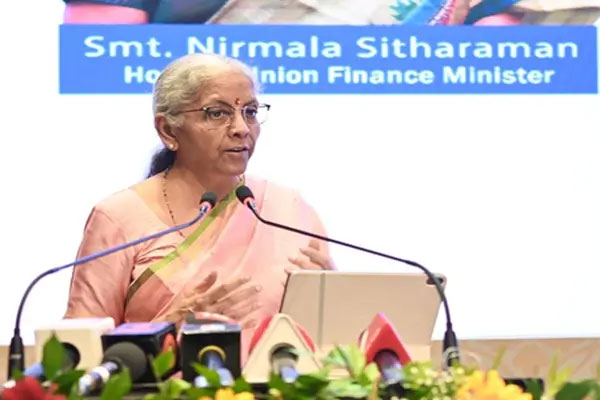Daijiworld Media Network - New Delhi
New Delhi, Oct 27: Finance minister Nirmala Sitharaman on Monday said that India’s journey toward Viksit Bharat (developed India) will not be shaped only in cities and industrial hubs but will be powered by its villages and farmers.
In a series of posts on social media platform X, citing her recent article, Sitharaman emphasised that the path to inclusive development lies in empowering farmers as entrepreneurs, turning every district into a processing hub, and ensuring equitable distribution of India’s economic gains.
She noted that under the government’s agricultural development plan, an umbrella brand, Kalyana Sampada, was launched to help each district identify specific agricultural products that could be converted into value-added commodities. This initiative, she said, aligns with Prime Minister Narendra Modi’s ‘One District, One Product’ vision — an extension of the Make in India initiative for the country’s annadatas (farmers).

“In each district, a Farmer Producer Company (FPC) was chosen by NABARD to run the food processing and training units. My MPLADS funds were used to help farmers by bringing agro-processing capabilities right to their doorstep,” Sitharaman said.
The finance minister underlined that agro-processing requires capital, technology, and strong market linkages, and stressed that building domestic capacity is vital in today’s uncertain global trade environment. “In an increasingly protectionist global environment, strengthening our domestic food processing capacity is a national security priority. Self-sufficiency in food processing ensures resilience against global disruptions and creates rural prosperity in tandem,” she wrote.
Calling for closer coordination between the Centre and states, Sitharaman said India is “primed for this leap” and that the spirit of cooperative federalism must drive efforts to replicate successful models nationwide.
Earlier this month, while inaugurating the Farmers Training and Common Facility Centre and a new agro-processing unit in Karnataka, the minister reiterated the government’s support for farmers. She highlighted initiatives such as soil health cards, fertiliser subsidies, financial assistance, and an increased minimum support price (MSP) for key foodgrains and pulses, reaffirming the government’s commitment to boosting rural income and agricultural growth.